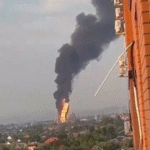
New Delhi: Recent Ukrainian drone strikes targeting Russian oil refineries have significantly disrupted the country’s refining infrastructure, causing fuel shortages in Russia and reverberating through global energy markets. The attacks have affected major facilities in regions such as Krasnodar Krai and Bashkortostan, reducing Russia’s refining capacity by approximately 17%, or 1.1 million barrels per day. Gasoline production alone has fallen by nearly 10%, prompting the Russian government to impose export bans on gasoline and partial restrictions on diesel.
For India, which imports around 35–40% of its crude oil from Russia, the disruptions carry both risks and opportunities. While India primarily imports crude and refines it domestically, the reduction in Russian refined product exports could increase pressure on domestic fuel prices if alternative sources are not secured.
However, India’s robust refining infrastructure presents an opportunity to process imported crude into refined products for both domestic consumption and export to global markets facing supply deficits. This could enhance India’s strategic role in the global energy sector, particularly as refining margins rise internationally.
Globally, the refinery disruptions have tightened supplies of diesel and gasoline, benefiting refiners outside Russia. Companies in the U.S. and Europe have reported improved refining margins and stock gains due to higher product prices. Analysts warn that further attacks on Russian energy infrastructure could escalate into a broader fuel supply crisis, affecting both developed and developing economies.
Union Petroleum and Natural Gas Minister Hardeep Singh Puri highlighted that India remains committed to energy security and strategic sourcing, emphasizing the importance of diversifying crude oil supplies while maintaining stable domestic fuel prices.
The situation underscores the fragility of global energy infrastructure and the interconnected nature of energy markets. For India, strategic diversification of crude sources and efficient utilization of domestic refining capacity will be crucial to navigate the evolving energy landscape, balancing economic, security, and diplomatic considerations.
Key Takeaways:
- Ukrainian drone strikes have reduced Russian refining capacity by ~17%.
- Fuel shortages in Russia include gasoline and diesel, prompting partial export restrictions.
- India’s import of Russian crude faces potential challenges but also opportunities for refining and export.
- Global refining margins have surged, benefiting non-Russian refiners.Strategic diversification and domestic refining will be key for India to mitigate risks.
